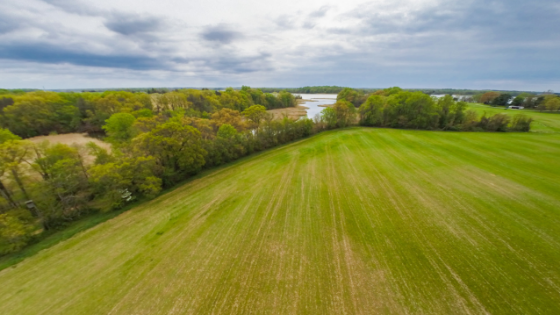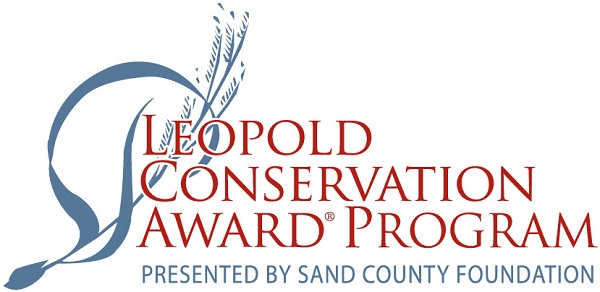Finalists Selected for New England Leopold Conservation Award

Five finalists have been selected for the first annual New England Leopold Conservation Award. This marks the first year the $10,000 award will be presented in New England.
Sand County Foundation, New England Forestry Foundation, and American Farmland Trust-New England, will present the $10,000 award to the recipient during The Eastern States Exposition (The Big E) in September.
Given in honor of renowned conservationist Aldo Leopold, the award celebrates voluntary conservation by farmers and forestland owners, who inspire others with their dedication to ethical land, water and wildlife habitat management. In his influential 1949 book, “A Sand County Almanac”, Leopold called for an ethical relationship between people and the land they own and manage.
The finalists are:
Guy Choiniere of Highgate Center, Vermont.
Choiniere Family Farm embraces conservation practices that build healthy soils and protect water quality. The certified-organic dairy farm uses an innovative compost bedding system for its grass-fed cattle. In addition to a 50-foot vegetated buffer along the farm’s frontage with the Rock River, Choiniere has planted 5,000 trees to reduce soil erosion. Keeping nutrients on the farm and out of the river, benefits water quality and the farm’s financial viability.
Steve and Lora Goss of Pike, New Hampshire.
StoneFen Farm uses regenerative grazing and stockpiling practices to raise grass-fed beef cattle. They worked with federal, state and local conservation agencies to reduce runoff into the Connecticut River by installing grassed waterways and concrete low-water crossings. They used prescribed thinning and harvesting to create a productive forest. The couple, who farm with their son and his wife, also have planted habitat for pollinator insects.
Bill Hull of Pomfret Center, Connecticut.
Hull is a leader in forest management, timber harvesting, and the manufacturing and marketing of wood products. He has pieced together an extensive land holding in multiple states since buying his first woodlot as a teen. He founded Hull Forest Products, Inc. whose mission is to preserve working forests, grow trees, and manufacture wood products and sustainable building materials. His forests provide bird and wildlife habitat, and stimulate the rural economy.
Perry Raso of South Kingstown, Rhode Island.
Raso operates Matunuck Oyster Farm and Matunuck Vegetable Farm, which supply his restaurant, Matunuck Oyster Bar. Raso, who began growing oysters in coastal waters on a one-acre farm, has opened a shellfish hatchery on property. He educates others on the environmental benefits that shellfish aquaculture. Oysters remove nitrogen-containing particles from water, which increases the oxygen available for other living things.
Linda Rinta of West Wareham, Massachusetts.
Rinta grows cranberries, blueberries and beachgrass at her family’s third generation farm. Water usage has been reduced on her farm with a renovated irrigation system. She has advocated for providing pollinator habitat beside cranberry bogs and solar arrays. Rinta raises honey bees and has planted acres of habitat for insect pollinators and native bees. Cape American Beachgrass is grown as a nursery product on the farm’s wetlands and sandy areas.
Earlier this year, owners of forestland and farmland in Connecticut, Maine, Massachusetts, New Hampshire, Rhode Island and Vermont were encouraged to apply (or be nominated) for the award. Applications were reviewed by an independent panel of agricultural and forestry conservation leaders.
“For New England’s inaugural Leopold Conservation Award, we’re pleased the finalists represent not only a variety of land-use types but also geographies, with properties ranging in location from coastal Rhode Island to far northern Vermont,” said Bob Perschel, New England Forestry Foundation Executive Director. “Everyone at New England Forestry Foundation is excited to recognize these landowners’ impressive conservation accomplishments.”
“The finalists for the New England Leopold Conservation Award embody the ideals of Aldo Leopold, and they highlight the work our farmers, foresters, and forestland owners are doing every day to protect land, provide clean water and air, combat climate change and produce safe, wholesome, high quality food and fiber for their communities,” said Nathan W. L’Etoile, New England Director of American Farmland Trust. “AFT focuses on land, practices and people and I’m proud that we have such a diversity of operations that are addressing each of these on their own operation.”
“Leopold Conservation Award recipients are at the forefront of a movement by America’s farmers, ranchers and foresters to simultaneously achieve economic and environmental success,” said Kevin McAleese, Sand County Foundation President and CEO.
The New England Leopold Conservation Award is made possible through the generous support of New England Forestry Foundation, American Farmland Trust-New England, The John Merck Fund, The Ida and Robert Gordon Family Foundation, Wildlands and Woodlands, Whole Foods Market, David and Ann Ingram, and the Yale School of Forestry and Environmental Studies.
Sand County Foundation presents the Leopold Conservation Award® annually in 20 states with a variety of conservation, agricultural and forestry organizations.
For more information on the award, visit www.leopoldconservaitonaward.org.
ABOUT PROGRAMS

LEOPOLD CONSERVATION AWARD PROGRAM
The Leopold Conservation Award is a competitive award that recognizes landowner achievement in voluntary conservation. Sand County Foundation presents the award in California, Colorado, Kansas, Kentucky, Missouri, Montana, Nebraska, North Dakota, Oklahoma, Pennsylvania, South Dakota, Texas, Utah, Wisconsin, and in New England (Connecticut, Maine, Massachusetts, New Hampshire, Rhode Island and Vermont).www.leopoldconservationaward.org
SAND COUNTY FOUNDATION
Sand County Foundation inspires and enables a growing number of private landowners to ethically manage natural resources in their care, so future generations have clean and abundant water, healthy soil to support agriculture and forestry, plentiful habitat for wildlife and opportunities for outdoor recreation. www.sandcountyfoundation.org
NEW ENGLAND FORESTRY FOUNDATION
At the core of New England Forestry Foundation’s work stands the belief that both conserving forestland and practicing sustainable forestry are essential to preserving the beauty, prosperity, wildlife habitats, and unique character of our region for future generations. Our approach strives to serve and unite people and organizations across the region to support the long-term health of New England’s forests, and to guarantee their continued environmental, recreational, and economic benefits for all New Englanders. https://newenglandforestry.org/
AMERICAN FARMLAND TRUST-NEW ENGLAND
The mission of American Farmland Trust is to save the land that sustains us by protecting farmland, promoting sound farming practices, and keeping farmers on the land.
